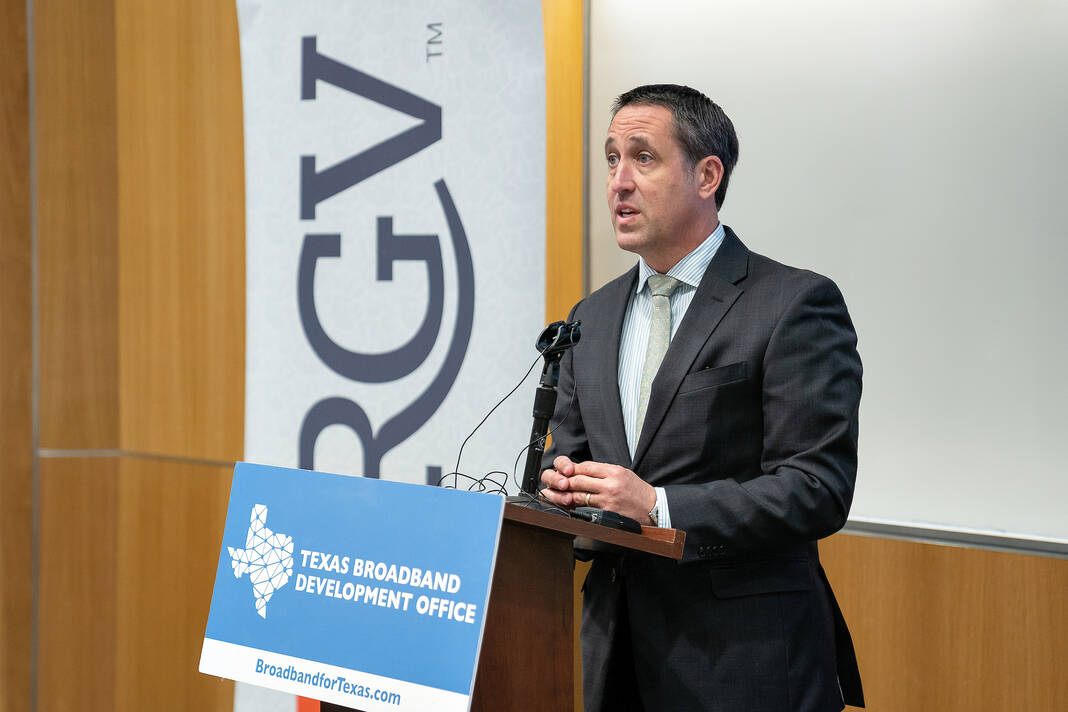EDINBURG — Texas Comptroller Glenn Hegar paid a visit here Tuesday as part of a statewide effort to expand internet access.
Hegar lent an ear to the suggestions and concerns of community members about how to make broadband more accessible during a stop at the University of Texas Rio Grande Valley as part of his Texas Broadband Listening Tour.
“We have 7 million people in the state that do not have internet access,” Hegar said. “Not only do we have seven million people across the state — almost 3 million households — that do not have internet access, the fact is, in this region, we have 51% of individuals that do not (have) wire connectivity and we roughly have a third that have no internet access at all,” Hegar added.
The need to expand internet access became more apparent over the last few years of the COVID-19 pandemic, Hegar said, given that many were going to work or attending school remotely.
“We have talked about internet access for a long time in large part because (of) economic development,” he said, “but we all know the last two years, economic development has also become an issue for telemedicine, access to health care, it’s become an access issue of higher education, of public education, and literally, it’s individual economic opportunity.”
Among the first speakers to offer their input was Brownsville City Manager Noel Bernal, who said that even before the pandemic, the city of Brownsville decided to invest in itself by launching its own broadband project because of what he described as a “market failure.”
“When a market failure occurs, typically government steps in to provide a public good,” Bernal said, noting the city would be breaking ground on a $90 million network project within a few months.
“We learned that the private sector did not and does not have any intentions of investing in fiber or broadband in our community,” Bernal said. “The same issues would persist if the city had not invested in itself.”
Learning that it is feasible for cities to responsibly invest in highly customized solutions for their communities, he suggested the state should partner with cities to provide those services.
While the private sector can have their place at the table, Bernal emphasized it should not be private-sector driven.
“At the end of the day, cities know their issues best,” he said. “They know their population, they understand their local assets, they have the ability to enable and facilitate and convene local partners.”
Jeff Patterson with VTX1 Companies, an internet service provider based in Raymondville, suggested the state needed to prioritize fiber networks.
“Fiber is future-proofed, it will take care of the children today, it will take care of businesses today, but more importantly, it’s going to take care of them five years from now or 10 years from now,” Patterson said, adding that the state first needed to focus on the unserved communities before moving to the underserved and then filling in gaps in other areas.
He also stressed the importance of having enough funds to maintain networks once they’re built.
“We want to make sure that local companies are able to maintain what they put into place,” he said.
Former McAllen Mayor Jim Darling suggested working with cooperatives to provide broadband service to rural areas while Edinburg Mayor Ramiro Garza Jr. emphasized the need for collaboration, especially in an area as interconnected as the Rio Grande Valley.
“Our cities used to be spread out, meaning there’s some gaps between our cities, that’s no longer the case so we don’t have a choice,” Garza said.
“We’re prepared to partner, in a collaborative way, with all the entities that we have in our city,” he added. “If there’s a way for us to partner with the state, we’re happy to do that and help facilitate what the priorities are and how we can increase connectivity here in our region.”
After the community members finished giving their input, Hegar said the conversations would continue in the future.
“We have a very tough task ahead of us, a lot of communities, a lot of individuals, a lot of businesses,” he said, reiterating Garza’s emphasis on working with different entities and stakeholders.
“It’s going to take a lot of partnerships,” he said.





